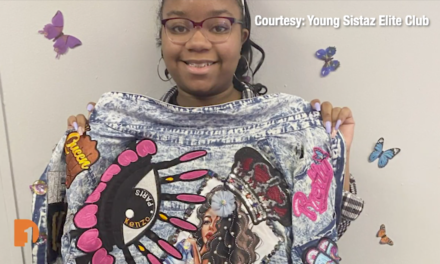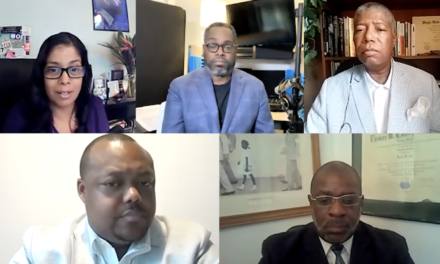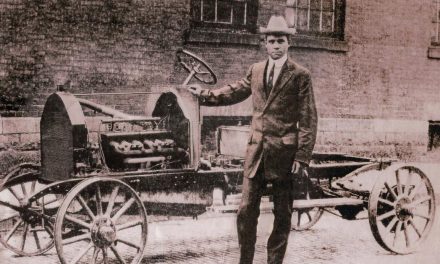The second biennial Black Midwest Symposium is coming to Detroit Oct. 20-22, 2022, at the Wayne County Community College District’s Curtis L. Ivery Downtown Campus. The event will explore the unique challenges Black Midwesterners face. Since the inaugural convening in the fall of 2019, Black Midwestern communities have been at the core of racial injustices and social justice movements.
This year, the convening will bring community members and Black thought leaders together to discuss the struggles of African Americans in the Midwest and Rust Belt regions, and the opportunities to bring about change in their local communities. “American Black Journal” host Stephen Henderson sits down with one of the event’s planning committee members, Marquis Taylor, to learn more about the goal of the symposium, this year’s theme— Presence and Protest, and the featured speakers.
Full Transcript:
Stephen Henderson, Host, American Black Journal: The Black Midwest Symposium. I’m not sure lots of people even know about this wonderful gathering of Black intellectuals, let’s call it.
Marquis Taylor, Planning Committee Member, Black Midwest Symposium: Yeah, for sure. So to kind of give you a backstory, the Symposium was started or rather is created by the Black Midwest Initiative, which is a group of scholars, activists, students, you name it.
We came together in 2017 when we were founded, and in 2019 we had our inaugural convening in Minneapolis, Minnesota, which I had the pleasure of living at for many years. And then we decided to do something biannually. So initially we wanted to do it in 2021, but everything that happened, so we moved it to 2022. So here we are in Detroit, my hometown, and excited to be here to have it.
And what it is, is a collection of, again, scholars, activists, speakers, poets, (and) writers. And we’re going to be convening October 20th through the 22nd over at Wayne County Community College, where, as I know it as, WC3 and we’ll be there and we’ll be able to connect with many different individuals, whether they be from Minneapolis, Detroit, Chicago, St Louis. But also amplifying other cities that people may not know about.
So the founder and the director of the program, Dr. Terrion Williamson, who’s out of the University of Illinois, Chicago. She is from Peoria, Illinois, to my understanding. So being able to amplify those places, Iowa. And for us to just kind of come together and just amplify our voices and just come together as a unit. So we’re excited to have this in Detroit.
Stephen Henderson: Yeah. So there is something about life in the Midwest and especially life in rust belt cities that have a different effect on African-Americans and a different history really with African-Americans than other parts of the country. Talk about what those differences are and why it’s important to be able to talk and think about those things consciously right now.
Marquis Taylor: Yeah, I think the Midwest, with respect to the West Coast, East Coast and even down South, we are oftentimes overlooked. And I know in many cases and I’ll use myself as an example. I’m born and raised in Detroit, lived in the twin cities for a number of years but my family migrated from Georgia. And centering our voices in contrast to the West and East Coast and again the deep South is that we were built on industry and thinking about the trade, the automotive industry. Think about Pittsburgh and some of the other places. Cleveland, same thing.
They were building on steel and, you know, the industrial portion. But it’s important to center our voices because in going to the things that happened in 2020 with the murder of George Floyd, we were there living in living color. And there were so many uprisings and protests and we wanted to center what happened.
But also looking at it from the perspective of how do we navigate all that had happened, but also navigating the historical development of the Midwest, again, paying homage to the Detroit, Minneapolis, Chicago, St. Louis and in some of the other cities as well. But it just is so important that we focus on who we are and just the things that we’ve been able to accomplish historically. And yeah.
Stephen Henderson: Yeah. So one of the panels that I’m really interested in that you’re holding is called The Commitment to Place Cultivating and Reclaiming Black Land in Michigan. That’s a fascinating title as a fascinating subject. It’s something that I feel like we’re just now really starting to see people acknowledge and want to know more about. But tell me about that panel.
Marquis Taylor: Yeah. So that reclaiming space to my understanding is going to feature a variety of individuals and thinking about what does it mean to reclaim that space. And I know historically we being on indigenous land and is also just thinking about who we are and you know, what we’ve been able to accomplish in the Midwest. So that panel in particular and so many panels that one escapes me off the top of my head. But to my understanding that’s more or less thinking about just reclaiming the space, focusing our energies, you know, being here in the Midwest.
Stephen Henderson: Yeah. Talk about the things that you would like people who attend this to be able to take away and talk about it, both in terms of African-American people, but also in terms of non-African-American people who might decide, hey, I want to show up for this too.
Marquis Taylor: I will say the biggest takeaway that we would want people to get from this or why we would want people to attend is number one, thinking about the synergy that exists in the Midwest. Again, thinking about those the cities that I highlighted, Detroit, Minneapolis (and) Chicago.
But in also just the work that we’ve been able to do. So I’m a big music fan, big fan of music, and one of the panels that I’m most excited about, I think, is the Black Midwestern futures. Where they’re going to be talking about the Minneapolis sound. Talking about Motown, talking about some of the other musical movements that have taken place in the Midwest. So just in terms of the speakers that we have. Aaron Foley is one of the opening speakers who is a Michigan State graduate, a Renaissance graduate, who’s a writer, an author, and there are other writers and panelists as well from the Midwest.
Jeff and Tamal Ray, who are renowned faculty at Michigan State University. But I would say just in terms of people wanting to learn about the diaspora, the Black diaspora or African diaspora that exists across the Midwest, how we’ve been able to leverage and do great things and being able to, you know, learn about the poets, the activists, the arts, and most importantly, how we were able to navigate the pandemic of 2020, but also just the protest and uprisings. And for us to kind of come together. So I would say those who are Black-identified and those who are not Black-identified, I think you’ll find something in it for everyone.
Stephen Henderson: Yeah. That Black diaspora dimension of this is a subject of a panel as well. And that really concentrates on the idea that there are lots of us in these places who came from other places in America, mostly the American South. But this continues to be a place of immigration for people from Africa. Talk about the importance of that mix and acknowledging that there is this diversity among blackness in the Midwest.
Marquis Taylor: That is a great question Stephen and I think with respect to where both myself and Terrion or Dr. Williamson where we connected in Minneapolis, Minnesota, there is a high concentration of East African immigrants. And for me personally, growing up in Detroit, I didn’t see that per se.
You see it in pockets, but I think I was able to see it more so living in the twin cities. And it’s important for us to recognize their contributions as well and us to kind of come together in unity, in the sense of understanding, you know, how they were able to come to this country versus, you know, us, those of us who were American born descendants of slavery.
And recognizing that we’re part of, you know, in many cases the same fight and the same struggle. But, you know, in respect to Minneapolis, I think Columbus, Ohio, also has a high concentration of East African immigrants. And there are other parts of the Midwest that escape me right now.
But I really just think that we just, you know, need to come together to unify. And again, having this lived experience, living in the twin cities, knowing what that was like and, you know, Dr. Williamson as well and as well as a few other panelists and people on the committee just to recognize our collective contributions because we’re more alike than we are different.
Stephen Henderson: Yeah. Okay. Marquis Taylor, really great to have you here on American Black Journal and congratulation on the second biannual Black Midwest Symposium. Thanks for being with us.
Marquis Taylor: Thank you.
Stay Connected:
Subscribe to Detroit Public Television’s YouTube Channel & Don’t miss American Black Journal on Tuesday at 7:30 p.m and Sunday at 9:30 a.m. on Detroit Public TV, WTVS-Channel 56.
Catch the daily conversations on our website, Facebook, Twitter and Instagram @amblackjournal.
View Past Episodes >
Watch American Black Journal on Tuesday at 7:30 p.m. and Sunday at 9:30 a.m. on Detroit Public TV, WTVS-Channel 56.




